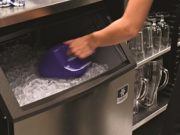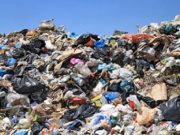Guest Columns
Home Guest Columns
 Green Lodging News provides a forum for anyone in the lodging industry to offer their take on a particular topic. All are welcome to participate. Submissions should be approximately 700 to 1,200 words and should include a photo of the writer. Authors can include a paragraph about themselves and their company at the end of the article. Contact Glenn Hasek, editor, at (813) 510-3868, or by e-mail at: greenlodgingnews@gmail.com.
Green Lodging News provides a forum for anyone in the lodging industry to offer their take on a particular topic. All are welcome to participate. Submissions should be approximately 700 to 1,200 words and should include a photo of the writer. Authors can include a paragraph about themselves and their company at the end of the article. Contact Glenn Hasek, editor, at (813) 510-3868, or by e-mail at: greenlodgingnews@gmail.com. Modular Bathrooms Offer Faster Construction, Green Benefits
From global hotel operators like Hilton, Marriott and InterContinental Hotels Group to independent hoteliers like the Broadmoor, more hospitality professionals are using modular construction to open properties faster and meet green building goals.
“We believe the modular process will be a game changer for our valued development partners, especially during a time when labor shortages can be a challenge to timely openings,” said Karim Khalifa, Marriott International’s former Senior Vice President of Global Design Strategies. The company’s commitment to this building process is highlighted in its Modular Construction Initiative, which called for 50 hotel deals in 2017 to incorporate pre-fabricated bathrooms...
What Does Sustainability Mean Today?
Sustainability is one of those buzz words we often hear when we discuss green and environmental issues. It typically applies to our use of natural resources; social responsibility; fair business profits; agriculture; the use of green cleaning products; etc.
While the word sustainability seems to be getting more and more “buzz,” there seems to be growing confusion as to what it really means. Making matters more problematic, even organizations such as the United Nations and other respected, worldwide bodies that have officially defined the word in the past, are now revising those definitions.
Let’s get a better understanding of what the...
Greening the Cleaning Supply RFP Process
Most hotel managers and sales departments are very familiar with requests for proposal and the RFP process. However, most of the RFPs they work with are from organizations that want to do business with the hotel. For instance, hold a meeting or conference at the property and asking what the charges would be.
However, many green properties are not that experienced in writing their own RFPs, and for green hotel properties, an RFP is essential. This is because they are selecting cleaning supplies and products that are environmentally preferable.
But first, let’s make sure we are all on the same page....
Steps to Healthy Hotel Housekeeping & Related Business Success
The American Hotel and Lodging Association (AHLA) reports there are about 50,000 hotel properties in the United States, providing 5 million rooms, and creating 2 million jobs. In a recent year, guests spent $2.5 billion a day, $105.8 million per hour, $1.8 million per minute, and $29,398 a second. (1)
In a competitive market, successful hotels strive to meet guest expectations; including providing a clean, healthy environment.
In a survey of 1,495 American travelers conducted by research firm TNS (2), 86 percent cited cleanliness as very important when seeking a place to stay, and 80 percent would rather give up Internet...
New Efficiency Standard Launches Cool Savings on Ice Makers
Commercial ice makers—the kind you see in hotel hallways, restaurants, and hospitals—can churn out anywhere from 50 pounds to 4,000 pounds of ice every day. They can produce regular cubes, ice nuggets for drink machines, or soft flakes used in supermarket displays, and they use a lot of water and energy to do it. As of last month, thanks to updated efficiency standards, almost every new ice maker sold in the United States will use 10 to 25 percent less energy.
Sunday (January 28) was the day that the Department of Energy’s (DOE) efficiency standard for automatic commercial ice makers went into...
Momentum Toward Building Energy Efficiency Transcends Harsh Political Climate
The momentum toward energy efficient buildings is transcending the harsh political climate in Washington, occurring primarily at the state and city levels in the United States, at the level of nonprofit organizations, and in other countries that are the fastest-growing source of climate pollution.
Locally initiated policies for improved building efficiency have always driven the bulk of activity at the national level, both in the United States and in countries such as Russia. With the ratification of the Paris Agreement on climate change, which calls for the world to pursue action to limit climate change to 1.5 degrees, we see...
Better Buildings Challenge Partners Demonstrate Sustainable Practices
When it comes to implementing energy efficiency measures in hotels, the hospitality sector faces unique challenges such as overcoming the limitations between ownership and management and accessing capital for upgrades, all while complying with brand standards and meeting guest comfort expectations. Three Better Buildings partners, HEI Hotels & Resorts, Loews Hotels & Co., and Las Vegas Sands Corp., are successfully overcoming these barriers and achieving significant energy savings while making progress towards their Better Buildings Challenge commitment of reducing portfolio-wide energy use by 20 percent in a decade. The U.S. Department of Energy’s Better Buildings Challenge (BBC) is part...
Five Ways to Floor Guests with Sustainable Design
Designing for the ultimate guest experience begins from the ground up. From the moment guests enter a hotel lobby, they should feel quality in every step, and the warmth and elegance of real hardwood floors make a huge impact on the crucial first impression. When designing for a spectacular hospitality experience, the most important decision—even more so than aesthetics—lies in choosing sustainable building materials that will look equally beautiful in year five as they did on day one. The flooring specified must be able to withstand thousands of guests in heels, countless wheeled carry-ons and damaging luggage carts, while...
Removing Trash Efficiently
Consumers in all industries continue to make the world’s pile of trash a little taller every year. As globalization is on the rise, goods are being produced—and thrown away—at alarming rates. With all this trash, the waste industry is at a crossroads: the amount of waste ending up in a landfill is at a steady increase, but we have more information and technology than ever before to guide us in a better direction. According to the LA Times, the United States “produced about 228 million tons of waste in 2006, a figure that climbed to 254 million tons by...
Some of the Advantages of Solar Rooftops on Hotels
Seems that the hospitality industry has grown fond of solar technologies during the last few years. Nowadays solar is more cost-effective and affordable than ever. It has also proven its efficiency and reliability over the last few decades which resulted in solar being more interesting and compelling to hotel managers. They are counting on certain environmental and economic benefits (not specifically in that order) which arise from installing solar rooftops on hotels. The dire predictions of the cost of energy bills steadily increasing in the upcoming years has made them intrigued with solar technologies. Reducing overhead sounds like every...














